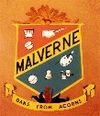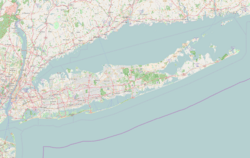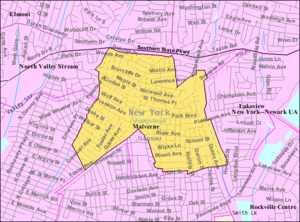Malverne, New York facts for kids
Quick facts for kids
Malverne, New York
|
||
|---|---|---|
| Incorporated Village of Malverne | ||
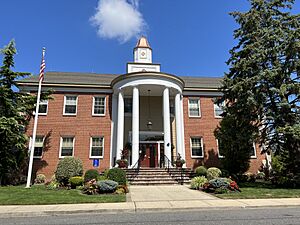
Malverne Village Hall on August 8, 2022.
|
||
|
||
| Nickname(s):
"The Mayberry of Long Island"
|
||
| Motto(s):
"Oaks From Acorns"
|
||
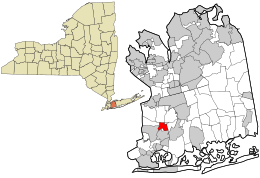
Location in Nassau County and the state of New York.
|
||
| Country | ||
| State | ||
| County | Nassau | |
| Town | Hempstead | |
| Incorporated | April 20, 1921 | |
| Named for | Malvern, England | |
| Area | ||
| • Total | 1.06 sq mi (2.74 km2) | |
| • Land | 1.06 sq mi (2.74 km2) | |
| • Water | 0.00 sq mi (0.00 km2) | |
| Elevation | 36 ft (11 m) | |
| Population
(2020)
|
||
| • Total | 8,560 | |
| • Density | 8,090.74/sq mi (3,124.03/km2) | |
| Time zone | UTC-5 (Eastern (EST)) | |
| • Summer (DST) | UTC-4 (EDT) | |
| ZIP code |
11565
|
|
| Area codes | 516, 363 | |
| FIPS code | 36-44787 | |
| GNIS feature ID | 0956328 | |
Malverne|similar uses|Malvern (disambiguation)|Malvern Malverne is a small village located in Nassau County, on Long Island, in New York. It is part of the Town of Hempstead. In 2010, about 8,514 people lived here.
Contents
Geography of Malverne
Malverne is a small place. It covers about 1.0 square mile (2.74 square kilometers). All of this area is land, with no large bodies of water.
History of Malverne
Early Settlements and Name Change
The area where Malverne is today was first settled by the Rockaway Indians. This happened a very long time ago. Later, in the 1700s, families like the Abrams, Bedell, and Pearsall families came and started farming.
The village was first called Norwood. In the early 1920s, people living there wanted it to become an "incorporated village." This means it would have its own local government. Parts of what are now North Lynbrook and Malverne Park Oaks were originally part of this plan. However, some residents decided not to join the new village.
Becoming an Incorporated Village
A vote was held, and most people agreed to form an incorporated village. Malverne officially became a village on April 13, 1921. But it had been acting like a village since October 1920.
The name was changed from Norwood to Malverne because there was already another Village of Norwood in New York State. The name Malverne comes from Malvern, England. A developer named Alfred Wagg liked the name after visiting Malvern.
Interestingly, the original spelling was "Malvern" (without the "e"). But when the Long Island Rail Road started service, they spelled it "Malverne" (with the "e"). Even though people tried to correct it, the village eventually changed its name to match the railroad's spelling.
Growth and Development
Malverne grew a lot because farmland was sold for building homes. Also, the Long Island Rail Road helped people travel. The Amsterdam Development Corporation built many of the houses in the village. Today, Malverne has over 3,000 homes.
Many people who live in Malverne travel to New York City for work or school. They use the Long Island Rail Road. Malverne has two train stations: Malverne and Westwood. Weekend train service was brought back in 2014.
The last working farm in Malverne is called Crossroads Farm at Grossman's. Nassau County bought it to keep it running.
Population of Malverne
| Historical population | |||
|---|---|---|---|
| Census | Pop. | %± | |
| 1930 | 2,256 | — | |
| 1940 | 5,153 | 128.4% | |
| 1950 | 8,086 | 56.9% | |
| 1960 | 9,988 | 23.5% | |
| 1970 | 10,036 | 0.5% | |
| 1980 | 9,262 | −7.7% | |
| 1990 | 9,054 | −2.2% | |
| 2000 | 8,934 | −1.3% | |
| 2010 | 8,514 | −4.7% | |
| 2020 | 8,560 | 0.5% | |
| U.S. Decennial Census | |||
How Many People Live Here?
According to the 2010 census, most people in Malverne were White. A smaller number were African American or Asian. About 8.6% of the population was Hispanic or Latino. In 2020, the population was 8,560.
Famous People From Malverne
Many interesting people have lived in Malverne, including:
- Jason Michael Brescia – a writer and director
- Gil Clancy – a famous boxing trainer and commentator
- Tony Danza – an actor
- Ralph Flanagan – a big-band leader
- Jeffrey Goldberg – an author and writer for The Atlantic Monthly
- Ray Heatherton – a stage and TV personality, known as "The Merry Mailman"
- Dan Ingram – a radio DJ
- Steven McDonald – a NYPD officer, writer, and speaker
- Charley Steiner – a sportscaster for the Los Angeles Dodgers
See also
 In Spanish: Malverne (Nueva York) para niños
In Spanish: Malverne (Nueva York) para niños


